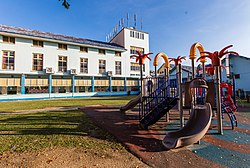Global Indian International School (GIIS) is a Singapore-based international school established in 2002.[3] With two campuses located in Punggol (Smart Campus) and Cheviot Hill (East Coast Campus), GIIS provides a diverse range of curricula options including GMP, IB PYP, IB DP, Cambridge IGCSE, CLSP, and CBSE. Admissions are open throughout the year. GIIS is under the Global Schools Foundation.
| Global Indian International School Singapore | |
|---|---|
 East Coast Campus (2020) | |
| Location | |
 | |
East Coast: 82 Cheviot Hill Singapore 459663 SMART: 27 Punggol Field Walk Singapore 828649 | |
| Coordinates | 1°23′25″N 103°54′42″E / 1.3902°N 103.9117°E |
| Information | |
| School type | Private International School |
| Established | 2002 |
| Chairman | Mr. Atul Temurnikar[1] |
| SMART Campus Principal | Ms. Melissa Maria |
| Faculty | 200 academic; 70 admin (2019) |
| Enrollment | ≈ 4,000[2] |
| Average class size | 30 |
| Education system | GMP, IB PYP, CBSE, Cambridge IGCSE, CLSP, IBDP |
| Classes offered | Grades KG-12 |
| Language | English, Hindi, Tamil, French, Mandarin and Spanish |
| Campus | SMART Campus, East Coast Campus |
| Slogan | Nurturing Future Citizens |
| Accreditation | IB, University of Cambridge IGCSE, Central Board of Secondary Education, EduTrust Singapore |
| Website | https://singapore.globalindianschool.org/ |
History
editGIIS' first campus at Cheviot Hill was established by Global Schools Foundation in 2002 with just 48 students,[4] with the aim of providing education to the expatriate community in Singapore.[5][6] A new campus, PG Smart Campus, was initially planned to start its operations in July 2018, having the capacity of 3,000 students. The Queenstown and Balestier campus later shut down to merge with the new campus. [7] The school has since expanded across South East Asia, Japan, Middle East and India throughout the years.
Campuses
editGIIS has two campuses in Singapore, one at Cheviot Hill, the East Coast campus, and another at Punggol, SMART Campus.[8]
Besides that, it has presence in over seven countries and 23 campuses which include those in Singapore, Malaysia (Kuala Lumpur), India (Hyderabad, Pune, Ahmedabad, Noida, and Bangalore), UAE (Abu Dhabi and Dubai), Thailand (Bangkok), Vietnam (Ho Chi Minh City) and Japan (Tokyo).[9][10]
Curriculum
editEducational programs offered by GIIS include:[11]
- Global Montessori Plus (GMP) Programme
- Central Board of Secondary Education (CBSE)
- International Baccalaureate Primary Years Programme (IB PYP) (In Singapore and Tokyo)
- Cambridge Lower Secondary Programme (CLSP) (In Singapore, Tokyo, Bangalore and Kuala Lumpur)
- Cambridge's International General Certificate of Secondary Education (IGCSE) (In Singapore, Kuala Lumpur,Bangalore)
- International Baccalaureate Diploma Programme (IBDP) (In Singapore, Tokyo)
See also
editReferences
edit- ^ "Campus Management | Executive Management | GIIS". www.globalindianschool.org. Archived from the original on 16 June 2019. Retrieved 28 June 2019.
- ^ Kim, Hyejin (2019). "The Creation of an International Education Sector". How Global Capital is Remaking International Education. SpringerBriefs in Education. pp. 15–27. doi:10.1007/978-981-32-9672-5_2. ISBN 978-981-32-9671-8. S2CID 202353529. Retrieved 5 July 2022.
- ^ "School History | International School History | It falls under the aegis of Global Schools Foundation. GIIS". www.globalindianschool.org. Archived from the original on 12 May 2018. Retrieved 11 May 2018.
- ^ Lim, Lisa; Pakir, Anne; Wee, Lionel (1 June 2010). English in Singapore: Modernity and Management. Hong Kong: Hong Kong University Press. p. 38. ISBN 978-988-8028-42-9.
- ^ Kesavapany, K. (1 August 2003). Rising India and Indian Communities in East Asia. Flipside Digital Content Company Inc. ISBN 978-981-4517-60-7.
- ^ "Global Indian International School Opens Second Tokyo Campus to Meet Growing Demand". Business Wire India. Business Wire India. Business Wire India. Retrieved 4 May 2019.
- ^ "Giis smart campus will commence operations from July".
- ^ Barman, Amrit (2009). India Fever: The New Indian Professional in Singapore. ISEAS - Yusof Ishak Institute. p. 84. ISBN 978-981-08-2319-1.
- ^ Watanabe, Shin (25 February 2019). "Japan's international schools flourish despite legal gray area". NikkieAsia. NikkieAsia. Retrieved 25 February 2019.
- ^ Bunnell, Tristan (27 June 2014). The Changing Landscape of International Schooling: Implications for theory and practice. Routledge. p. 109. ISBN 978-1-317-81449-8.
- ^ "Global Indian International School to Launch NextGen SMART Campus in Singapore's Digital District". AsiaOne. AsiaOne. AsiaOne. Retrieved 27 April 2019.